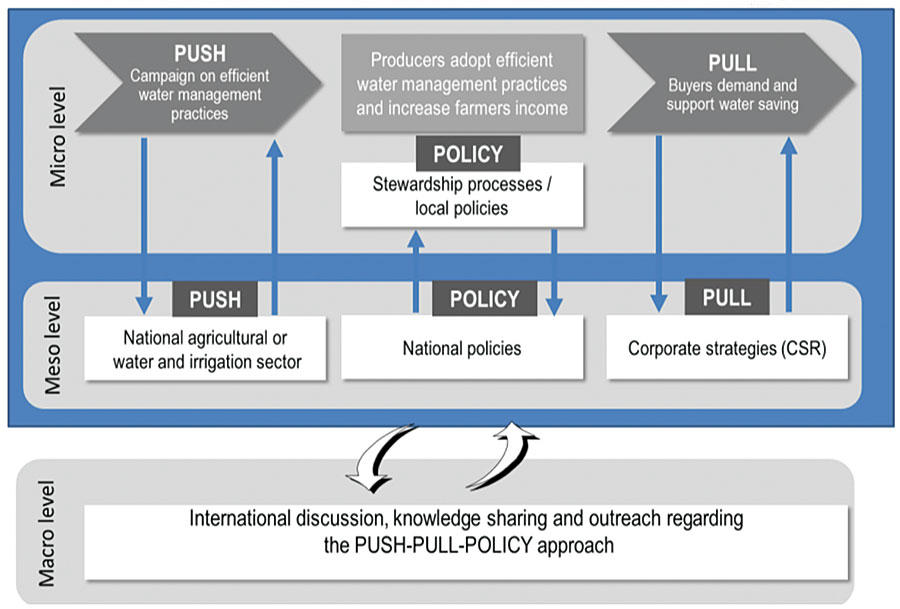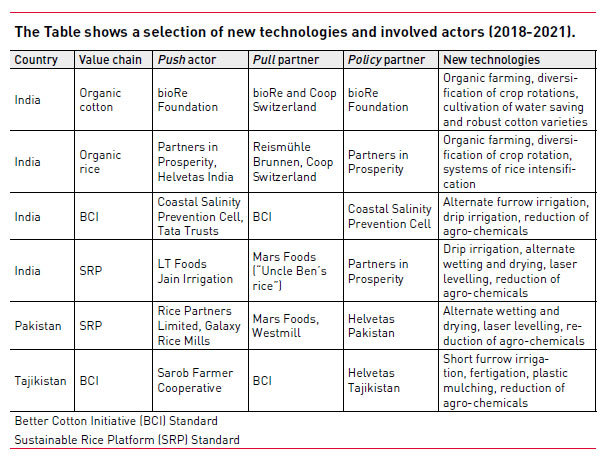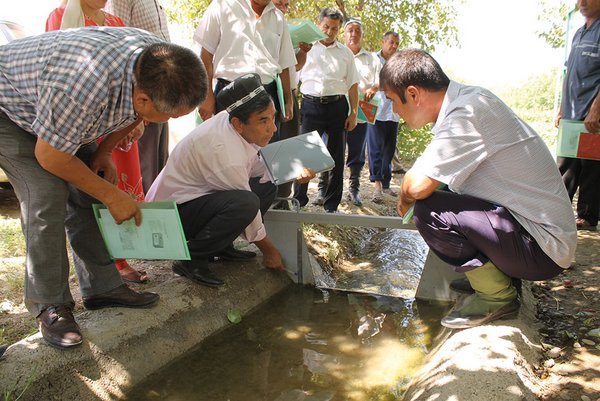 Download this article in magazine layout
Download this article in magazine layout
- Share this article
- Subscribe to our newsletter
Enhancing water productivity by using a “push-pull-policy” approach
Water productivity – or the ratio of agricultural output per unit of water input – is important for increasing food security. More than two-thirds of human water consumption is used for agriculture. As climate change advances, water is becoming a scarce resource, further threatening the already fragile state of agriculture in many countries and creating a growing risk of conflict over rights to water resources. Addressing water issues is thus a key component for achieving sustainable development, reducing hunger while promoting peace and economic well-being.
Helvetas Swiss Intercooperation is the consortium leader of a multi-sectoral group of actors who are rolling out an innovative approach through the Water and Productivity Project (WAPRO, see Box). The goal is to address inefficient irrigation practices in smallholder farming. To tackle this problem, the Swiss Agency for Development and Cooperation (SDC) and Helvetas jointly developed the push-pull-policy approach. Actors from the private sector, civil society and standard bodies joined forces to address challenges of water scarcity and sustainable irrigation management. New production and irrigation practices shall allow farmers to maintain or grow their incomes without putting additional strain on local water supplies. The project focuses on rice and cotton, two highly water-intensive crops that play important roles in local food security and economic growth.
The WAPRO project
The WAPRO project was first implemented between 2015 and 2018 in four countries in Asia (India, Pakistan, Kyrgyzstan, and Tajikistan) by a consortium of nine partners involving 23,600 farmers. The milestones achieved so far are a reduced consumption of irrigation water of 15 to 33 per cent and an increase in farmer’s income of between 6 and 32 per cent.
The second phase of the project is being implemented from 2018 to 2021 in ten subprojects operating in six countries (India, Pakistan, Kyrgyzstan, Tajikistan, Myanmar and Madagascar).
In collaboration with the Islamic Development Bank, key elements are being replicated in ten sub-Saharan countries (The Gambia, Senegal, Guinea, Sierra Leone, Niger, Mali, Burkina Faso, Benin, Côte d’Ivoire and Cameroon). The number of countries covered by the project in Asia and Africa has now grown to 16, with 22 partners aspiring to improve the lives of 60,000 farmers. Diverse stakeholders – from farmers and local NGOs to corporations and governments – take joint responsibility for the precious resource water.
While the Sustainable Rice Platform (SRP), the Alliance for Water Stewardship (AWS) and the Better Cotton Initiative (BCI) are project steering partners, providing guidance to farmers on sustainable production and water stewardship, WAPRO’s experience and evidence help the standard revision processes. For example, the project plays an important role in rolling out the new Water Stewardship Principle of the BCI standards globally, and its experience in implementing water stewardship at farmer level is fed into the technical committee of AWS.
The push component – learning
Farmers are the main consumers of global water reserves, but are also among the poorest citizens of the world. Poverty prevents them from accessing water-saving knowledge. Within the push component, they are trained on new sustainable production technologies and water saving methods such as modern irrigation practices, intercropping, soil cover or mulching, laser levelling, water measuring, and others (see Table on page 24). Farmers in Kyrgyzstan and Tajikistan save 30-40 per cent of water by switching to shorter furrows, which allow for a better balanced water distribution. In addition, diversified crops using water and other resources more efficiently than monoculture crops are promoted. Lentils planted into a rice field are first irrigated by the same water which is used as the last irrigation flow for rice. Results are shared with the national agriculture and water sector actors to encourage the replication of the technology, which has proved successful.

Local circumstances can only lead to different implementing actors in the push component of the push-pull-policy approach. Here, public extension services often have insufficient capacities to implement projects on their own. In this case, the implementing party is either a civil society organisation, a service provider or the private sector itself. Nevertheless, collaboration with public extension services is planned for many sub-projects of the WAPRO project, thereby allowing for a broader outreach of the new technologies introduced. In all sub-projects, the agricultural production of either rice or cotton was linked not only to water saving technologies, but to broader sustainability standards (BCI, SRP, AWS, etc.) as well.
The more traditional push component is important, although more is needed to increase an uptake of improved practices. So how to create incentives and policies to support these practices? This is where the pull and policy components come in.
The pull component – financial benefits
Even among farmers who are aware of water saving methods, only a few end up adopting them. Without financial incentives, they are reluctant to make significant investments of time and money for an environmental benefit only. By promoting methods that not only save water but also increase production, farmers have a financial incentive to save water. In India, for example, the system of rice intensification allowed an increase in crop productivity of 70 per cent compared to traditional methods. Turning pull activities into practice is realised by local value chain actors, who are the responsible purchasing and processing agents within the value chain. These private-sector actors create additional incentive mechanisms for farmers either by offering premium prices for crops produced under sustainability standards, pre-payment of the crop, access to microcredits, and secure access to enhanced markets or integration into agricultural extension programmes (e.g. saving money by using less pesticide). Activities within the pull component consist of the “off-take” of the products produced by the farmers taking part in the training and extension of the push component.
The policy component – governance
A lack of governance in water distribution, maintenance of channel systems and irrigation infrastructure, and timing of irrigation goes beyond the reach of an individual farmer or company. Consequently, farmers often do not apply water-productive technologies and irrigate as much as possible when water is available. The solution is a policy dialogue based on evidence. The local policy component is realised by civil society organisations strengthening the capacities of water user associations in implementing agreed-upon action plans. The activities of the policy component consist of workshops with the farmers, other water users and water management/irrigation authorities by following the guidance outlined in the standard of the AWS. Rather than waiting for top-down policy changes, farmers and other villagers jointly agree on a reasonable way to share water resources and create plans to improve the local water situation. Farmers work with the local authorities to adapt the regulatory frameworks, for example regarding water distribution rights or water payment schemes. For the implementation of the policy component, it is important that the private sector does not try to act either as a convening nor facilitating actor. Such attempts could easily be perceived as influencing local water distribution, and thus would probably attract a lot of criticism and objections. The external impulse given by the pull of the private sector catalyses local awareness, aiming to achieve behavioural change with regard to a more sustainable water management through the farmers and a better governance through the decision-makers. The governance changes at local level help advance national agriculture, commodity and irrigation reforms and pave the way to scaling up the approaches to other regions.

Advantages for smallholder farmers
The key advantage for smallholders is leveraged by the support of the value chain actors and implementation of a commodity standard that ensures productivity gains, market access and premium prices when producing under sustainability standards. Farmers not only counteract challenges of water scarcity and climate change, but also realise collective action for water governance improvements. Since they are contributing to improvements by changing their production technologies, they justify postulating improvements realised by local irrigation authorities either with regard to the water distribution cycles or via renovation of canal irrigation infrastructures.
Being able to produce under international standards improves market proposition of the agricultural produce next to the direct sustainability improvements that the implementation of standards is related to. The push-pull-policy approach supports farmers’ groups in expanding their sphere of influence by implementing the push themselves, and then becoming a relevant and reliable partner for the local water governance discussions.
Advantages for the private sector
Many private companies and brands interact with farmers in a value chain activity. Ensuring the future raw material supply with high quality standards, the improvement of the sustainability performance and preventing potential image risks as well as the opportunity to communicate such activities in tangible and comprehensible ways to consumers are key drivers for such types of engagement. Nevertheless the impact is very much restricted to activities that can be rolled out with farmers directly or with farmers’ cooperatives. Addressing the more complex challenge of water governance or even higher levels of water regulations and policies is neither the role nor the qualification of private sector actors. This sphere of action can be added with the policy component of this project approach allowing the private sector to engage in complex fields such as the water sector and its overall management.
Advantages for international donors and the national public sector
International donors – in the case of WAPRO this is SDC – can help to steer the process with a particular focus on a systemic change in the policy component. Furthermore, the supporting funds are relevant to “de-risk” the engagement of all parties, since it is unlikely that an individual actor would risk engagement in all components alone. The advantage for the international donor communities is the integration of the private sector into long-term sustainability and development engagements. Thereby the impacts can be leveraged, and the collective understanding of a development agenda increases.
The national public sector, i.e. the government, benefits from the engagement of the international actors and the momentum that is created by combining improved technologies at field level with local policy discussions. In many cases gridlocked discussions can be opened up. Moreover, debating modern technologies and sustainable production methods is encouraged.
Outlook
The push-pull-policy approach is a set-up for future public-private partnerships where public goods (water, forest or communal land are in focus for a more sustainable use, often referred to as a landscape approach) or complex sustainability challenges (land degradation, biodiversity loss and climate change) require concerted efforts of different stakeholders. The clear roles assigned to involved entities and the synergistic effects unlocked by the project components leverage development progress that could not be achieved, if either the push or policy activities were carried out as “stand-alone projects”. Only the close intertwining with the pull of the private sector ensures that the long-term benefits can be perpetuated even after the supporting funds of the public sector have run out. The allocation of responsibilities of the components also allows for an efficient replication of similar projects. Given the time pressure for action in the sustainability challenges, this may be a welcome basis for quantum leaps in the sustainability impact of such projects.
Jens Soth works as Senior Advisor in commodity projects at Helvetas Swiss Intercooperation in Zurich, Switzerland.
Christina Blank is Programme Officer of the Global Programme Food Security at Swiss Agency for Development and Cooperation in Bern, Switzerland.
Contact: jens.soth@helvetas.org





Add a comment
Be the First to Comment